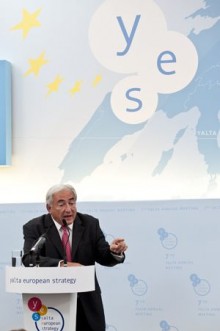Less than a week is left until December 22, when the Executive Board of the International Monetary Fund will consider the first review under the stand-by agreement with Ukraine. As a result, Ukraine intends to get a second tranche of the loan (about 1.6 billion dollars). After the Fund’s mission visited Kyiv in November, it declared that the question was coordinated on an expert level. On December 8 the Ukrainian government approved the IMF draft memorandum. However, this only became known on December 14, while society is still not familiarized with the text of this document.
What does the government conceal from us and why? So far this question remains unanswered, but it is not difficult to predict that the afore-mentioned memorandum contains some provisions that Ukrainians will not welcome. According to the information, which was leaked from different sources, the memorandum confirms that the Ukrainian government, after some hesitations, intends to gradually increase the retirement age for women (from 55 to 60 years). The fact that after April 15, 2011, the increase of gas prices by 50 percent is planned for households, public heating and energy enterprises will not be a pleasant New Year’s surprise either. Unsurprisingly, the current level of our knowledge about this document is close to zero.
It is quite possible that one will find elements in this document that will become a foundation of the country’s monetary management and its program of socio-economic development, which, contrary to legal requirements, were not submitted to the parliament during the consideration of the budget. At any rate, the government will report to the IMF about the new Tax Code, about the state budget for 2011, recently approved in the first reading, about the governance reforms, and most importantly — about the pension reform, the essence of which remains secret for the country’s citizens.
The burden of uncertainty our society usually bears is not lightened by the intentions of the Cabinet of Ministers to adopt a resolution on holding an open public discussion about the major social-economic reforms, “to take into account opinions of citizens for their (not opinions’ and not citizens’, but reforms’) improvement.”
Prime Minister Mykola Azarov doesn’t even think about why we need the reforms, which will need revising once they were implemented. He entrusts the Deputy Prime Minister for Social Policy Serhii Tihipko, who headed the process of elaboration of the bill on amendments in the retirement legislation, to organize a broad public discussion about the reform’s content. According to premier, the discussion and advancing proposals, in particular, take place on the website of the Ministry of Social Policy. “We must involve all layers of the population of Ukraine in the public discussion and making suggestions. It is necessary to take all corresponding suggestions into consideration in our work,” pointed out Azarov.
Here we highlight the word “corresponding” and want to ask the premier whether he really believes that people will start discussing that about which they know almost nothing? Empty words! Besides, when is one supposed to organize, hold and take into account the conclusions of the consideration and discussion, if the documents about the reform of the retirement system are not yet published, while they should be submitted to the parliament, according to some information, already this week? Why hurry? Isn’t it done in order to hand a voluntarily, publicly approved tightened belt on a silver platter to the IMF?
Are there no other ways to solve the difficult socio-economic problems of the country? Perhaps the government shouldn’t discard the “nonconstructive” criticism from the opposition? For example, MP Natalia Korolevska asks: “If according to official information inflation in the country is nine percent, and the growth of the gross domestic product is five percent, where is the money which ensures economic growth?” “This money is absent in the official statistics of the budget revenue,” states the deputy. “This shows that for the first time the shadow economy increases by means of the growth of the gross domestic product.” Korolevska believes that 50 percent of economy cannot work in the shadows if it is not protected by the government. Will this opinion be taken into account, just like the one expressed in the course of the public discussion or, as millions of others, will it remain ignored?







